| Listing 1 - 9 of 9 |
Sort by
|
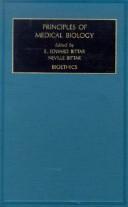

ISBN: 1559388013 Year: 1994 Publisher: Greenwich Jai Press
Abstract | Keywords | Export | Availability | Bookmark
 Loading...
Loading...Choose an application
- Reference Manager
- EndNote
- RefWorks (Direct export to RefWorks)
Bioethics. --- Medical ethics. --- bio-ethiek (medische, biomedische ethiek, bio-ethische aspecten) --- klinische proef (klinische studie, geneesmiddelenstudie) --- experiment, experimenteel onderzoek (dieren, dierproeven) --- aids (HIV) --- levenseinde (einde van het leven, levenseindebeslissing) --- bioéthique (éthique médicale, biomédicale, aspects bioéthiques) --- essai clinique (étude clinique) --- expérimentation sur l'animal --- sida (VIH) --- fin de vie (décision de fin de vie)
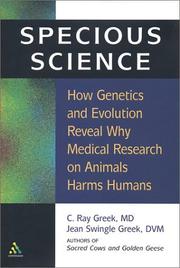
ISBN: 0826413986 Year: 2002 Publisher: New York (N.Y.) : Continuum,
Abstract | Keywords | Export | Availability | Bookmark
 Loading...
Loading...Choose an application
- Reference Manager
- EndNote
- RefWorks (Direct export to RefWorks)
Arguing that there is a great divide between species that makes extrapolation of biochemical research from one group to another utterly invalid, this book provides the argument's scientific underpinning in accessible language, examining paediatrics, brain diseases, new surgical techniques and more. The authors of this book argue that there is a great divide between species that makes extrapolation of biochemical research from one group to another utterly invalid. In their previous book, "Sacred Cows and Golden Geese: The Human Cost of Experiments on Animals", the Greeks showed how an amorphous but insidious network of drug manufacturers, researchers dependent on government grants to earn their living, even cage-manufacturers - among others benefiting from "white-coat welfare" - have perpetuated animal research in spite of its total unpredictability when applied to humans. (Cancer in mice, for example, has long been cured. Chimps live long and relatively healthy lives with AIDS. There is no animal form of Alzheimer's disease.) In doing so, the Greeks aimed to blow the lid off the "specious science" we have been culturally conditioned to accept. Taking these revelations one step further, this book uses accessible language to provide the scientific underpinning for the Greeks' philosophy of "do no harm to any animal, human or not," by examining paediatrics, diseases of the brain, new surgical techniques, in vitro research, the Human Genome and Proteome Projects, an array of scientific and technological breakthroughs and more.
Animal experimentation --- Animal models in research. --- Diseases --- Animal models. --- experiment, experimenteel onderzoek (dieren, dierproeven) --- experiment, experimenteel onderzoek (mensen) --- expérimentation sur l'animal --- expérimentation sur la personne humaine (chez l'humain) --- Animal experimentation. --- Animal models in research --- Animal disease models --- Disease models, Animal --- Medicine, Comparative --- Medicine, Experimental --- Pathology, Comparative --- Pathology, Experimental --- Biological models --- Laboratory animals --- Research --- Experimentation on animals --- Zoopery --- Animal models


ISBN: 076580025X 0765806851 Year: 2001 Publisher: New Brunswick Transaction
Abstract | Keywords | Export | Availability | Bookmark
 Loading...
Loading...Choose an application
- Reference Manager
- EndNote
- RefWorks (Direct export to RefWorks)
Animal experimentation has made a crucial contribution to many of the most important advances in modern medicine. The development of vaccines for deadly viruses like rabies and yellow fever depended upon animal research, and much of our basic knowledge about human health and physiology was discovered through the use of animals as well. Inspite of these gains, animal rights activists have been zealous in communicating to the public and policymakers their view that the use of animals in medical research is morally wrong and should be severely curtailed or eliminated. The activists' arguments draw upon a range of disciplines and focus on both practical and ethical aspects of animal experimentation. Advocates of animal experimentation have been slow to respond to these arguments. Given that the worldwide toll of communicable diseases is still immense--and that deadly new pathogens may emerge at any time in the future to menace human health--failing to defend animal experimentation from the arguments of its opponents has disastrous implications. A quick response to an unanticipated threat on the order of the AIDS epidemic is unimaginable absent a vigorous research establishment, which in turn is dependent on animal proxies. This work is an attempt by research scientists and moral philosophers to mount a defence against animal rights enthusiasts. Contributors scrutinize how animal experimentation functions in the laboratory, the role that it plays in eradicating disease, and the moral justification for using animals. "Why Animal Experimentation Matters" is a first attempt by research scientists and moral philosophers to mount a convincing defense against animal rights enthusiasts. Because opponents of animal experimentation come from a variety of intellectual backgrounds, this defense is necessarily interdisciplinary as well. In this collection of eight essays, the authors scrutinize how animal experimentation actually functions in the laboratory, the vital role that it plays in palliating and eradicating human and animal diseases, and the moral justification for sacrificing animals for the betterment of human life. The subjects covered in the essays include the moral status of animals and persons, the importance of animals for advancing scientific knowledge, the history of animal experimentation (and of its detractors), differing theoretical approaches of American and European animal-experimentation regulations, the heavily restrictive legislation promoted by animal rights activists, and the threats posed to research and researchers by violent animal rights zealots. This important anthology will be of interest to scientists, philosophers, individuals suffering from heritable or communicable diseases, relatives of afflicted individuals, and policymakers.
Animal experimentation --- Animal models in research --- Animal welfare --- Animals --- Medicine --- Moral and ethical aspects. --- Treatment --- Research --- experiment, experimenteel onderzoek (dieren, dierproeven) --- medisch-wetenschappelijk onderzoek --- ethiek (ethische aspecten) --- expérimentation sur l'animal --- recherche médicale --- ethique (aspects ethiques) --- Health Workforce --- Biological models --- Laboratory animals --- Moral and ethical aspects --- Research&delete&
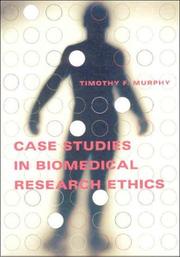
ISBN: 0262134373 0262632861 Year: 2004 Publisher: Cambridge, Mass. MIT
Abstract | Keywords | Export | Availability | Bookmark
 Loading...
Loading...Choose an application
- Reference Manager
- EndNote
- RefWorks (Direct export to RefWorks)
An overview of the key debates in biomedical research ethics, presented through a wide-ranging selection of 149 case studies. This textbook for instruction in biomedical research ethics can also serve as a valuable reference for professionals in the field of bioethics. The 149 cases included in the book are grouped in nine chapters, each of which covers a key area of debate in the field. Some of the case studies are classics, including the famous cases of the Tuskegee Syphilis Study (in which subjects with syphilis were not given treatment) and the Willowbrook hepatitis studies (in which institutionalized subjects were intentionally exposed to hepatitis). Others focus on such current issues as human embryonic stem cell research, cloning by somatic nuclear transfer, and the design and function of institutional review boards. Each chapter begins with a brief introduction that places the issues raised in context; this is followed by a number of cases (each of which is no more than a few pages). Study questions meant to encourage further discussion follow each case. After an introductory discussion of the history and tenets of ethics in medical research, the book's chapters cover the topics of oversight and study design; informed consent; the selection of subjects; conflicts of interest; the social effects of research; embryos, fetuses, and children; genetic research; the use of animals; and authorship and publication. Following these chapters are appendixes with the texts of the Nuremburg Code and the Declaration of Helsinki, two key documents in the establishment of bioethical standards for research.
Professional ethics. Deontology --- Human medicine --- Bioethics --- Medical ethics --- Research --- experiment, experimenteel onderzoek (mensen) --- bio-ethiek (medische, biomedische ethiek, bio-ethische aspecten) --- casuïstiek (gevallenstudie, gevalstudie) --- geïnformeerde vrijwillige toestemming (instemming) --- proefpersonen --- belangenconflict --- genetica (genen) --- experiment, experimenteel onderzoek (dieren, dierproeven) --- expérimentation sur la personne humaine (chez l'humain) --- bioéthique (éthique médicale, biomédicale, aspects bioéthiques) --- casuistique --- consentement libre et éclairé --- sujets (participants) d'expérimentation --- conflit d'intérêt --- génétique (gènes) --- expérimentation sur l'animal --- Biomedical ethics --- Clinical ethics --- Ethics, Medical --- Health care ethics --- Medical care --- Medicine --- Biology --- Life sciences --- Life sciences ethics --- Moral and ethical aspects --- Professional ethics --- Nursing ethics --- Social medicine --- Science
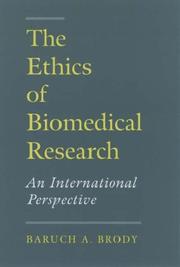
ISBN: 0195090071 9780195090079 Year: 1998 Publisher: New-York: Oxford university press,
Abstract | Keywords | Export | Availability | Bookmark
 Loading...
Loading...Choose an application
- Reference Manager
- EndNote
- RefWorks (Direct export to RefWorks)
This book analyzes the major issues of research ethics through a careful review of the treatment in official policies on research ethics developed throughout the world (especially North America - Western Europe - and the Pacific Rim).
Professional ethics. Deontology --- Human medicine --- Human experimentation in medicine --- Medical ethics. --- Medicine --- Research. --- Ethics, Medical. --- Moral and ethical aspects. --- Research --- biomedisch, medisch-wetenschappelijk onderzoek --- ethiek (ethische aspecten) --- experiment, experimenteel onderzoek (dieren, dierproeven) --- experiment, experimenteel onderzoek (mensen) --- Medisch onderzoek --- Medische ethiek --- Dierproef --- Dierenwelzijn --- recherche biomédicale --- ethique (aspects ethiques) --- expérimentation sur l'animal --- expérimentation sur la personne humaine (chez l'humain) --- Recherche médicale --- Ethique médicale --- Expérimentation animale --- Bien-être des animaux --- Medical ethics --- Health Workforce --- Biomedical ethics --- Clinical ethics --- Ethics, Medical --- Health care ethics --- Medical care --- Bioethics --- Professional ethics --- Nursing ethics --- Social medicine --- Moral and ethical aspects --- Research&delete& --- Medicine - Research - Moral and ethical aspects --- Human experimentation in medicine - Moral and ethical aspects
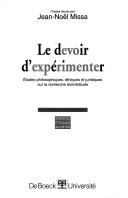
ISBN: 280412245X 9782804122454 Year: 1996 Volume: *22 Publisher: Bruxelles: De Boeck,
Abstract | Keywords | Export | Availability | Bookmark
 Loading...
Loading...Choose an application
- Reference Manager
- EndNote
- RefWorks (Direct export to RefWorks)
Cet ouvrage réunit des études abordant le caractère pluriel de l'expérimentation sur l'homme. La première partie s'intéresse à des situations particulières de la recherche en clinique humaine. Sont ainsi analysées les question éthiques qui se posent dans divers secteurs de la recherche médicale: recherches sur l'embryon et le foetus, transplantation intracérébrale de cellules foetales, recherches réalisées sur le patient hospitalisé dans un service de soins intensifs, sur l'individu en état végétatif chronique et sur le malade cancéreux. La seconde partie rassemble des études juridiques et philosophiques qui envisagent la question des structures de régulation en matière de recherche biomédicale (comités d'éthique, lois sur l'expérimentation humaine, recommandations internationales, ...) ainsi que les dimensions sociales et philosophiques de l'expérimentation humaine.
Biologie --- Ethique philosophique --- Geneeskunde --- Gerecht --- Justice --- Médecine --- Wijsgerige ethiek --- Human experimentation in medicine --- Expérimentation humaine en médecine --- Moral and ethical aspects --- Law and legislation --- Aspect moral --- Droit --- Experimentation humaine en médecine --- Ethique medicale --- 17.023.33 --- 241.63*5 --- experiment, experimenteel onderzoek (mensen) --- bio-ethiek (medische, biomedische ethiek, bio-ethische aspecten) --- recht (wetgeving, rechtspraak, rechtsbeginselen, juridische aspecten, aansprakelijkheid) --- experiment, experimenteel onderzoek (dieren, dierproeven) --- expérimentation sur la personne humaine (chez l'humain) --- bioéthique (éthique médicale, biomédicale, aspects bioéthiques) --- droit (aspects juridiques, législation, jurisprudence, principes de droit, responsabilité) --- expérimentation sur l'animal --- Ethique médicale. --- Expérimentation humaine en médecine. --- Expérimentation humaine en médecine --- Éthique médicale --- expérimentation sur la personne humaine (chez l'humain) --- bioéthique (éthique médicale, biomédicale, aspects bioéthiques) --- droit (aspects juridiques, législation, jurisprudence, principes de droit, responsabilité) --- expérimentation sur l'animal
Book
ISSN: 1102481X ISBN: 916312386X 9789163123863 Year: 2002 Volume: 4 Publisher: Stockholm: Swedish fund for research without animal experiments,
Abstract | Keywords | Export | Availability | Bookmark
 Loading...
Loading...Choose an application
- Reference Manager
- EndNote
- RefWorks (Direct export to RefWorks)
dier (rechten) --- experiment, experimenteel onderzoek (dieren, dierproeven) --- animal (droits) --- expérimentation sur l'animal --- Humane education --- Animal rights --- Dissection --- Animal experimentation --- Animal welfare --- Laboratory animals --- Animal Experimentation --- Animal Testing Alternatives --- Animal Welfare --- Animals, Laboratory --- Laboratories --- Animals, Experimental --- Animals in research --- Experimental animals --- Lab animals --- Animal culture --- Laboratory organisms --- Working animals --- Abuse of animals --- Animal cruelty --- Animals --- Animals, Cruelty to --- Animals, Protection of --- Animals, Treatment of --- Cruelty to animals --- Humane treatment of animals --- Kindness to animals --- Mistreatment of animals --- Neglect of animals --- Prevention of cruelty to animals --- Protection of animals --- Treatment of animals --- Welfare, Animal --- Surgery --- Animal liberation --- Animals' rights --- Rights of animals --- Education, Humane --- Education --- Moral education --- Laboratory Animals --- Animal, Laboratory --- Laboratory Animal --- Disease Models, Animal --- Biomedical Research --- Animal Cruelty --- Cruelty, Animal --- Vivisection --- Animal Use Alternatives --- Euthanasia, Animal --- Moral and ethical aspects --- ethics --- education --- Abuse of --- Social aspects --- Study and teaching --- Animal Welfare. --- Animal testing alternatives --- Animal use alternatives --- Models, animal
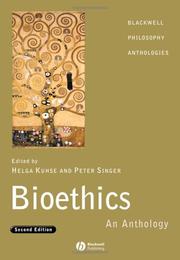
ISBN: 1405129484 9781405129480 1405129476 9781405129473 Year: 2005 Volume: 9 Publisher: Malden: Blackwell,
Abstract | Keywords | Export | Availability | Bookmark
 Loading...
Loading...Choose an application
- Reference Manager
- EndNote
- RefWorks (Direct export to RefWorks)
The expanded and revised edition of Bioethics: An Anthology is a definitive one-volume collection of key primary texts for the study of bioethics. * Brings together writings on a broad range of ethical issues relating such matters as reproduction, genetics, life and death, and animal experimentation. * Now includes introductions to each of the sections. * Features new coverage of the latest debates on hot topics such as genetic screening, the use of embryonic human stem cells, and resource allocation between patients. * The selections are independent of any particular approach to bioethics. * Can be used as a source book to complement A Companion to Bioethics (1999).
Bioethics --- Medical ethics --- begin van het leven --- recht op gezondheidszorg --- orgaandonatie --- stamcelonderzoek --- experiment, experimenteel onderzoek (dieren, dierproeven) --- commissie voor medische ethiek (ethisch comité, CME) --- début de vie --- droit aux soins de santé --- qualité de vie (années de vie ajustées sur la qualité) --- don d'organes --- recherche sur des cellules souches --- expérimentation sur l'animal --- comité d'éthique médicale (comité d'éthique, CEM) --- Biology --- Professional ethics. Deontology --- Bioethical Issues --- Bioethics. --- Ethics, Medical --- Medical ethics. --- Ethique médicale --- Bioéthique --- bio-ethiek (medische, biomedische ethiek, bio-ethische aspecten) --- experiment, experimenteel onderzoek (mensen) --- genetica (genen) --- levenseinde (einde van het leven, levenseindebeslissing) --- levenskwaliteit --- Biomedical ethics --- Clinical ethics --- Health care ethics --- Medical care --- Medicine --- Life sciences --- Life sciences ethics --- bioéthique (éthique médicale, biomédicale, aspects bioéthiques) --- expérimentation sur la personne humaine (chez l'humain) --- génétique (gènes) --- fin de vie (décision de fin de vie) --- Moral and ethical aspects --- Professional ethics --- Nursing ethics --- Social medicine --- Science --- Bioéthique --- Euthanasie --- Génétique --- Procréation médicalement assistée --- Aspect moral

ISBN: 0631197370 9780631197379 Year: 1998 Volume: 15 Publisher: Oxford: Blackwell,
Abstract | Keywords | Export | Availability | Bookmark
 Loading...
Loading...Choose an application
- Reference Manager
- EndNote
- RefWorks (Direct export to RefWorks)
This volume contains all that the beginning reader or student needs to soundly grasp the ideas and issues involved in the field. Building on the model used by Peter Singer in his highly successful Companion to Ethics, the Companion to Bioethics consists of 46 specially written essays designed to present the key issues and concepts in bioethics in an authoritative yet always readable, non-technical manner. An unusually comprehensive index allows the reader to find terms and topics not listed in the titles of the essays themselves. A Companion to Bioethics is an essential work of reference for doctors, nurses, lawyers, journalists, philosophers, moral theologians, sociologists and everyone interested in the ethical issues that are transforming our lives. It will be applicable both to everyday health care practice, and to the far-reaching issues arising from the revolution in the biological sciences as applied to human ethics.
General ethics --- Bio-ethiek --- Bioethics --- Biologie humaine -- Morale et aspects éthiques --- Biology--Moral and ethical aspects --- Biomedical ethics --- Biomedische ethiek --- Biomédecine -- Morale et aspects éthiques --- Bioéthique --- Deontologie [Medische ] --- Deontology [Medical ] --- Déontologie médicale --- Ethics [Medical ] --- Ethiek [Medische ] --- Ethiek in biologie --- Ethique en biologie --- Ethique médicale --- Life sciences ethics --- Life sciences--Moral and ethical aspects --- Medical care -- Moral and ethical aspects --- Medical deontology --- Medical ethics --- Medicine -- Moral and ethical aspects --- Medische deontologie --- Medische ethiek --- Morale et médecine --- Morale médicale --- Médecine -- Innovations -- Morale et aspects éthiques --- Médecine -- Morale et aspects éthiques --- Médecine et morale --- Politique sanitaire -- Morale et aspects éthiques --- Soins médicaux -- Morale et aspects éthiques --- Éthique clinique --- Bioethics. --- Medical ethics. --- 174.2 --- bio-ethiek (medische, biomedische ethiek, bio-ethische aspecten) --- ethische theorie --- voortplanting (reproductie) --- levenseinde (einde van het leven, levenseindebeslissing) --- recht op gezondheidszorg --- orgaantransplantatie (allocatie van organen, donorschaarste) --- aids (HIV) --- experiment, experimenteel onderzoek (mensen) --- experiment, experimenteel onderzoek (dieren, dierproeven) --- Clinical ethics --- Ethics, Medical --- Health care ethics --- Medical care --- Medicine --- Professional ethics --- Nursing ethics --- Social medicine --- Biology --- Life sciences --- Science --- Beroepsmoraal van de artsen. Medische beroepsethiek --- bioéthique (éthique médicale, biomédicale, aspects bioéthiques) --- théorie éthique --- procréation (reproduction) --- fin de vie (décision de fin de vie) --- droit aux soins de santé --- transplantation d'organes (greffe d'organes, pénurie d'organes, allocation d'organes) --- sida (VIH) --- expérimentation sur la personne humaine (chez l'humain) --- expérimentation sur l'animal --- Moral and ethical aspects --- 174.2 Beroepsmoraal van de artsen. Medische beroepsethiek --- Bioéthique --- Ethique médicale
| Listing 1 - 9 of 9 |
Sort by
|

 Search
Search Feedback
Feedback About UniCat
About UniCat  Help
Help News
News